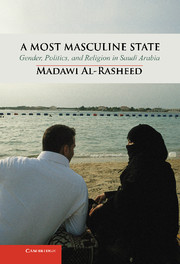Book contents
- Frontmatter
- Contents
- Acknowledgments
- Introduction
- 1 From Religious Revival to Religious Nationalism
- 2 Schooling Women
- 3 Symbols of Piety
- 4 The Quest for Cosmopolitan Modernity
- 5 Women in Search of Themselves
- 6 Celebrity Women Novelists and the Cosmopolitan Fantasy
- 7 Guarding Self and Nation
- Conclusion
- Glossary
- Bibliography
- Index
- References
Conclusion
Light at the End of the Tunnel
Published online by Cambridge University Press: 05 February 2013
- Frontmatter
- Contents
- Acknowledgments
- Introduction
- 1 From Religious Revival to Religious Nationalism
- 2 Schooling Women
- 3 Symbols of Piety
- 4 The Quest for Cosmopolitan Modernity
- 5 Women in Search of Themselves
- 6 Celebrity Women Novelists and the Cosmopolitan Fantasy
- 7 Guarding Self and Nation
- Conclusion
- Glossary
- Bibliography
- Index
- References
Summary
My intention in this book was to go past the contradictory images of Saudi women and situate the ‘woman question’ in a wider context beyond religion and tribalism. The persistent marginalisation of Saudi women that is perhaps unmatched in the Muslim world needs to be understood within a historical and political context. While recognising the patriarchal inclination embedded in existing religious tradition, cultural, and social norms, shared in various degrees by all women in the Muslim world, Saudi women's marginalisation is a function of a historical process in which religion was turned into a state religious nationalist ideology. This makes other variables less convincing on their own in explaining the ‘woman question’. Too much ink has been spilt over the restrictions imposed by the Saudi religious tradition and the essentially conservative society in which this tradition is upheld. There is no doubt that Saudi religious scholars and judges initiate the most restrictive religious opinions and sentences, perpetuate women's exclusion, and contribute to their confinement and marginalisation. But these religious opinions are neither new nor the sole prerogative of Saudi ulama. Many other Muslim scholars endorse them and propagate their origins in old treatises on women. Equally, tribal social organisation and ethos survive in other countries, not to mention the neighbouring Gulf states of Kuwait, Qatar, and Oman. In these countries, women have gained relatively more rights, and their inclusion in the labour force and public life has taken place at a time when Saudi women are still banned from driving cars. This is not to say that women in these societies have achieved real equality in social, economic, and political life, but compared to Saudi women they definitely enjoy greater recognition and economic participation. The struggle of Gulf women seems to have moved beyond driving and the male guardianship system. They share with Saudi women the experience of living under the umbrella of authoritarian states whose difference is only a matter of degree. But their states were founded without invoking a religious nationalist ideology.
- Type
- Chapter
- Information
- A Most Masculine StateGender, Politics and Religion in Saudi Arabia, pp. 280 - 296Publisher: Cambridge University PressPrint publication year: 2013



